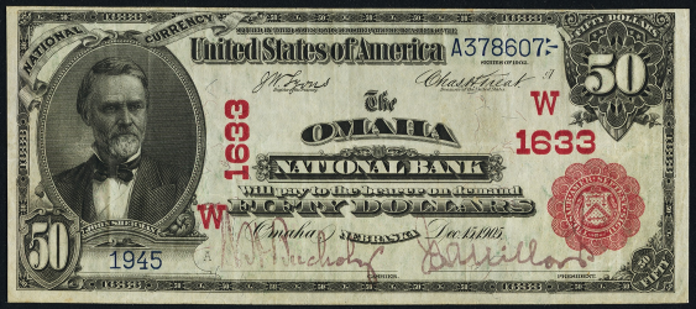Fifty Dollar Notes › Nationals › 1902 Fifty Dollar National Bank Notes › Maryland Charters › 1902 $50 Hampstead Maryland First National Bank
Get Value Now
| Item | Info |
|---|---|
| Series | 1902 |
| Charter | #9755 First National Bank of Hampstead, Maryland |
| Year Chartered | 1910, 291 Banks Chartered |
| City Info | Hampstead is a town in Carroll County in the U.S. state of Maryland. The population was 6,323 at the 2010 census. Between 1736 and 1738, Robert Owings was assigned to "cut a new road as Christopher Gist had marked it" south from Conewago to a point about halfway to Fort Garrison in Baltimore County. The village of Spring Garden became a stage-line stop on the new road and later became the town of Hampstead, named after Hampstead, in England. The first settlers to the area were English immigrants who made their way west from the Port of Philadelphia. They were followed by Scots and Germans. Hampstead was used by farmers from surrounding areas as a center to obtain goods brought from Baltimore and to send produce to markets in Baltimore and Pennsylvania. The level and fertile land, coupled with the availability of lime, gave farmers important advantages for successful farming. In 1879, the Harrisburg Division of the Western Maryland Railroad reached Hampstead. The accessibility of the railroad attracted new residents and made dairy … Source: Wikipedia |
| Similar Cities | City name is unique, no others like it. |
| Seal Varieties | Red, Blue |
| Other Info | 1. Value depends on notes known for charter, condition and market demand. |
| Neat Fact | Plate letters A-C for $50 Notes, A for $100 Notes (Friedbergs, 20th Ed. P 99) |
No Obligations Offers and Appraisals
Please submit a good photo or scan. It will be identified and evaluated. Understand there may be subtle differences between the image you see above and your note. Signatures, design, markings and note condition will determine the offer price. Notes in Uncirculated or better condition receive the best offers.
Appraisals can be estimated for wholesale and retail prices. Wholesale is what dealers typically pay. Retail is what a collector might pay. Retail is slightly higher in most cases.
Please visit this page for USA Paper Money Reference. Do not treat this page as a reference guide, it is for appraisal and acquisition purposes only.
